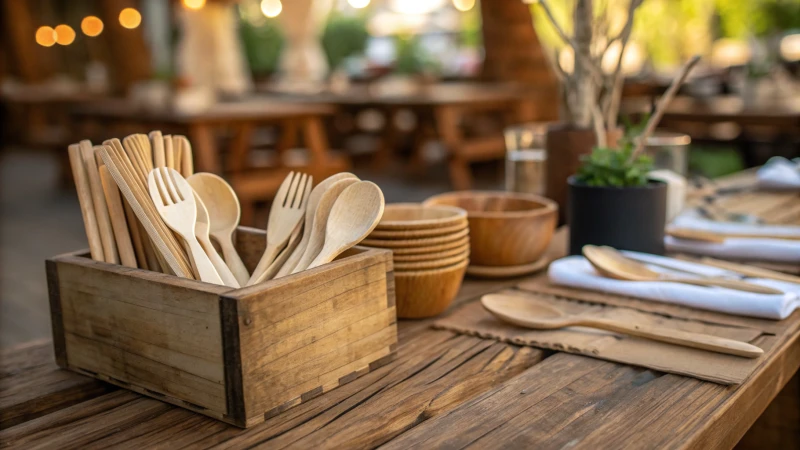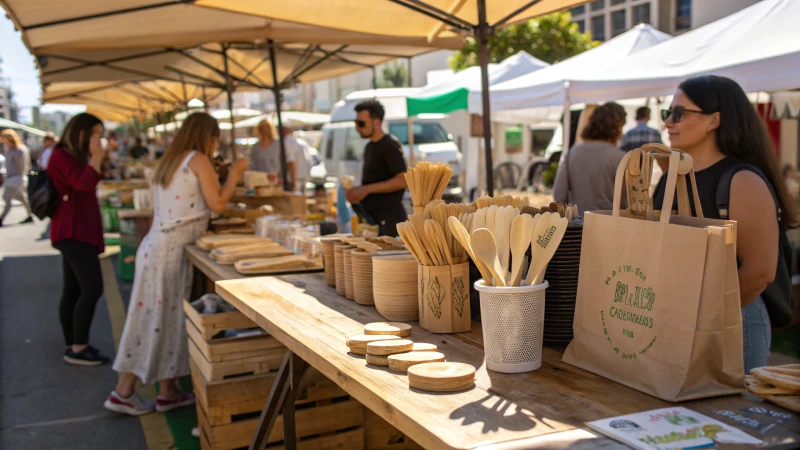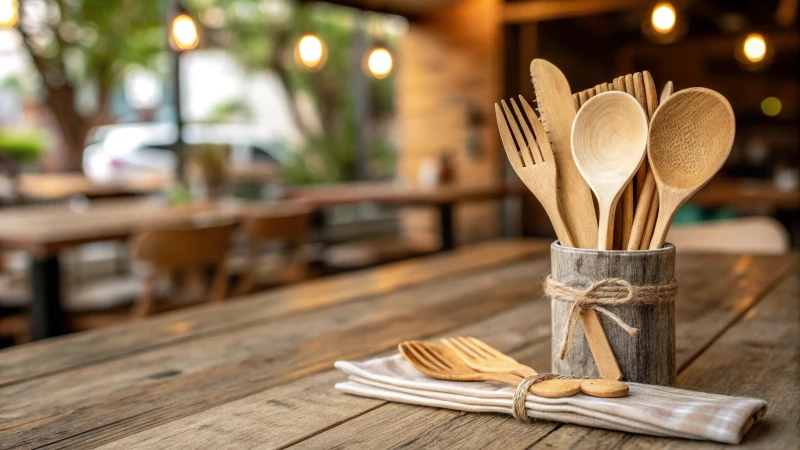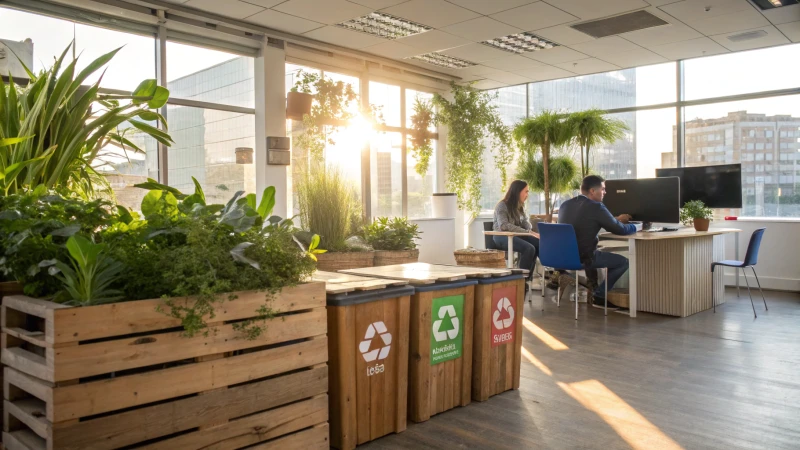
When I first heard about the shift away from single-use plastics, it was like a wake-up call for our everyday habits.
As single-use plastic regulations tighten, I've noticed a significant push towards eco-friendly solutions like disposable wooden cutlery. This shift not only aligns with growing environmental awareness but also presents a sustainable choice for both businesses and consumers aiming to minimize their ecological footprint.
Reflecting on this transformation, I remember chatting with a local café owner who switched to wooden cutlery. He mentioned how customers seemed to appreciate the change, viewing it as a step towards a more sustainable future. This small decision had a ripple effect, enhancing his brand's image and drawing in more eco-conscious patrons.
In the broader picture, these regulations aren't just about compliance; they're about opportunity. For businesses like mine that aim to integrate sustainability into their core practices, understanding these shifts can open doors to innovation and growth. Wooden cutlery isn't just a product; it's a statement that resonates with our values and those of our customers.
Single-use plastic bans boost wooden cutlery demand.True
Regulations against plastics increase demand for sustainable alternatives like wooden cutlery.
Wooden cutlery is more expensive than plastic.True
The cost of production and materials for wooden cutlery typically exceeds that of plastic.
How Are Global Plastic Bans Reshaping Market Dynamics?
It's amazing how the simple decision to ditch plastic can ripple through entire industries, sparking innovation and changing the way businesses operate. Let's dive into how these bans are reshaping markets and fueling demand for greener alternatives.
Global plastic bans are reshaping markets by accelerating demand for sustainable alternatives like wooden cutlery, encouraging innovation in eco-friendly products, and altering consumer behavior and business strategies across sectors.

The Rise of Sustainable Alternatives
Imagine walking into your favorite café and being handed a beautifully crafted wooden fork instead of the usual plastic one. That's a small example of a massive shift happening as countries tighten their rules on single-use plastics. With these changes, the demand for eco-friendly alternatives, like wooden cutlery, is skyrocketing. Take restaurant chains1—many are now sourcing these sustainable options to fulfill their environmental promises. It's a trend that's hard to ignore, and I can't help but feel a sense of pride every time I choose these eco-friendly options myself.
| Material | Eco-Friendly | Biodegradable |
|---|---|---|
| Plastic | No | No |
| Wooden Cutlery | Yes | Yes |
Impact on Consumer Behavior
Have you ever found yourself picking products that are a bit more eco-friendly just because it feels right? You're not alone. As more people become aware of environmental issues, there's a noticeable shift in consumer preferences. Many of us now prefer businesses that take sustainability seriously. This is particularly evident in the hospitality industry2, where guests are increasingly choosing places that minimize plastic use. It's inspiring to see how our choices as consumers can drive such significant change.
Innovation and Business Strategy
These bans are pushing companies to think outside the box, leading to some pretty innovative products. Businesses are reimagining their products and materials, often partnering with suppliers that specialize in green solutions. E-commerce platforms3, for example, are now focusing on eco-friendly packaging in response to consumer demand. It’s exciting to see how necessity breeds creativity!
Challenges in Implementation
Of course, nothing worth doing is easy. The transition to sustainable practices comes with its challenges. Businesses must deal with supply chain adjustments and potential cost increases. Yet, those who embrace these changes early often find themselves ahead of the competition. Even government sectors like government procurement4 are setting examples by prioritizing sustainable suppliers. It's a testament to how perseverance and innovation can lead to success.
These changes highlight the profound impact of global plastic bans on market dynamics, underscoring the growing importance of sustainable practices across industries. It's a journey we’re all on together, and every small choice adds up.
Wooden cutlery demand is rising due to plastic bans.True
Countries are adopting stricter regulations, boosting eco-friendly alternatives.
Plastic bans decrease innovation in product design.False
Bans encourage companies to innovate and find sustainable solutions.
What Makes Wooden Cutlery a Better Choice Than Plastic?
Ever wonder why wooden cutlery is becoming the go-to choice for eco-conscious diners like me?
Wooden cutlery is an eco-friendly alternative to plastic, offering benefits like biodegradability and compostability, which help reduce plastic waste. It’s non-toxic, safe for food use, and adds a natural, stylish touch to dining experiences.

Environmental Impact: A Step Towards Sustainability
I remember the first time I saw wooden cutlery at an outdoor event. It was refreshing to see a product that could return to nature without leaving a trace. Wooden cutlery is naturally biodegradable and compostable, making it a superior choice5 for those of us who are mindful of our ecological footprint. Unlike plastic, which can linger in landfills for centuries, wooden utensils break down naturally within months.
| Feature | Wooden Cutlery | Plastic Cutlery |
|---|---|---|
| Biodegradability | Yes | No |
| Decomposition Time | Months | Hundreds of years |
| Compostable | Yes | No |
Health and Safety: Non-Toxic and Safe
There's a comforting feeling knowing that the wooden fork I'm using isn't leaching harmful chemicals into my meal. Wooden cutlery is free from the nasty chemicals often found in plastics, like BPA. This makes it a safer option for food contact, especially when I'm cooking up something hot. For health-conscious consumers6 like me and businesses, this safety aspect is crucial.
Aesthetic and Sensory Appeal
The first time I set the table with wooden utensils, it was like bringing a touch of nature into my home. The natural look and feel of wooden cutlery can truly enhance the dining experience, offering a rustic yet elegant touch to any setting. Many hospitality venues choose wooden utensils to align with their eco-friendly ethos and provide a more visually appealing7 table setting.
Practical Benefits: Durability and Functionality
I used to think wood wasn't as durable as plastic, but I was pleasantly surprised. Modern wooden cutlery is designed to be sturdy enough for various foods while remaining lightweight. Plus, it doesn’t melt or warp when exposed to heat, making them practical for diverse uses8. Now I don't have to worry about my fork bending or my spoon snapping while enjoying my favorite meals.
Wooden cutlery decomposes in months.True
Wooden utensils are biodegradable, breaking down naturally within months.
Plastic cutlery is safer than wooden.False
Plastic can leach toxins, unlike non-toxic wooden cutlery.
Who is leading the charge toward wooden cutlery?
Remember that time you realized the world was shifting beneath your feet? That's how it feels watching industries embrace wooden cutlery.
The hospitality, healthcare, and retail sectors are at the forefront of adopting wooden cutlery, driven by sustainability goals and regulatory pressures to replace plastic utensils with eco-friendly alternatives.

Hospitality and Food Service
I've always admired how the hospitality industry adapts to changing times. Remember when smoking bans came into restaurants? This is like that but greener! Restaurants, hotels, and catering services are now opting for wooden cutlery to replace plastic. This change isn't just a nod to eco-trends; it's often a necessity due to environmental regulations9 banning single-use plastics. I’ve heard stories of high-end eateries going all-in, using premium-quality wooden utensils as part of their brand image overhaul.
| Business Type | Reason for Shift |
|---|---|
| Restaurants | Regulatory compliance, brand image |
| Hotels | Sustainable guest experience |
| Caterers | Client demand for eco-options |
Healthcare Sector
Switching gears to healthcare, I've seen hospitals and clinics make bold moves toward sustainability. It’s a sector where every material must meet strict safety standards, so when they opt for wooden cutlery, it's a big deal. These biodegradable options not only comply with safety criteria but also help reduce their carbon footprint. Imagine visiting a hospital that's as committed to healing the planet as it is to healing its patients. Talk about a breath of fresh air!
Learn more about healthcare's role10 in adopting sustainable practices.
Retail and E-commerce
Retail and e-commerce are following suit. As someone who enjoys browsing through aisles of new products or scrolling online for the latest trends, I've noticed more retailers stocking eco-friendly items like wooden cutlery. They're responding to what we, as conscious consumers, want: sustainable products that we feel good about using.
- Retail Example: Stores like Whole Foods showcase eco-friendly cutlery options.
- E-commerce Trend: Online platforms such as Amazon highlight sustainable products to attract green shoppers.
Explore more about retail trends11 in sustainability.
These industries aren't just reacting to consumer demand; they're actively shaping it. By adhering to evolving environmental policies, they're setting themselves up as leaders in the green movement. Each sector has its unique approach to adopting wooden cutlery, but they all share a common goal: promoting sustainability and reducing plastic waste. It's inspiring to see such shifts toward a greener future!
The hospitality industry is a leader in adopting wooden cutlery.True
Restaurants and hotels switch to wooden cutlery for eco-friendly branding.
Healthcare sector avoids wooden cutlery due to safety concerns.False
Healthcare adopts wooden cutlery for its biodegradable and safe properties.
How Can Businesses Transition Smoothly to Sustainable Alternatives?
Ever wondered how businesses can transition smoothly to sustainable alternatives? It's not just about being green—it's a journey that can redefine your company’s impact and legacy.
Businesses can transition smoothly to sustainable alternatives by conducting a thorough audit, setting tangible sustainability goals, engaging key stakeholders, and implementing changes gradually. Collaborating with certified suppliers can also streamline the transition process.

Conducting a Sustainability Audit
When I first realized the need for a more sustainable approach in my business, it felt like standing at the base of a towering mountain. I knew the climb was necessary but daunting. The first step was a sustainability audit, a bit like taking inventory of everything we were doing right—and wrong. By thoroughly analyzing our resource usage, waste management, and supply chain, we found surprising opportunities to go green.
- Resource Usage: I was amazed at how much energy and water we were consuming unnecessarily.
- Waste Management: We discovered new recycling opportunities that could not only save costs but also reduce our environmental footprint.
- Supply Chain: Investigating our suppliers revealed some practices that were far from eco-friendly.
Setting Clear Sustainability Goals
Setting goals turned out to be an exercise in both hope and realism. I started with short-term objectives—like reducing plastic usage by 30%—that gave us quick wins and built momentum. Long-term, the dream of achieving carbon neutrality feels like a North Star guiding our decisions.
| Timeframe | Objective |
|---|---|
| Short-term | Reduce plastic usage by 30% |
| Long-term | Achieve carbon neutrality |
Engaging Stakeholders
I quickly learned that sustainability is not a solo venture. Engaging all stakeholders—from employees to customers—was key. We held workshops and feedback sessions that not only educated but also empowered everyone involved. Their enthusiasm and ideas often sparked initiatives I hadn’t even considered.
Implementing Gradual Changes
Our journey to sustainability wasn’t about flipping a switch; it was about gradual change. Starting with the low-hanging fruits, like switching to eco-friendly packaging12, made the process feel less overwhelming. Little by little, these adjustments started to add up.
Collaborating with Certified Suppliers
Finding the right partners was like discovering a secret weapon. Collaborating with certified suppliers who shared our vision made a huge difference. They offered products with guaranteed quality and ethical sourcing, giving us peace of mind and helping us stay on course.
- Certification Benefits: The assurance of product quality and ethical sourcing was invaluable.
- Supplier Support: They provided guidance and resources that made the transition smoother.
By embracing these strategies, I've seen firsthand how businesses can transition smoothly into sustainable operations, benefiting both the environment and the bottom line. It's not just about compliance or marketing—it's about redefining what success looks like in today's world. For those looking to delve deeper into creating a sustainable supply chain, exploring supply chain optimization strategies13 might just be the next step in your journey.
Conducting a sustainability audit identifies improvement areas.True
Audits assess current practices, highlighting areas for sustainable changes.
Engaging stakeholders is unnecessary for sustainability success.False
Stakeholder engagement ensures support and success in sustainability efforts.
Conclusion
Single-use plastic regulations are driving demand for eco-friendly wooden cutlery, reshaping consumer behavior and business strategies while promoting sustainability across various industries.
-
Discover how restaurant chains adapt to plastic bans by integrating sustainable practices, gaining consumer trust, and enhancing brand reputation. ↩
-
Learn about initiatives in the hospitality sector to reduce plastic usage, appealing to eco-conscious travelers and promoting sustainability. ↩
-
Explore how e-commerce platforms are shifting towards eco-friendly packaging to meet rising consumer demands for sustainable products. ↩
-
Understand how government procurement policies are leading the way in selecting sustainable suppliers, fostering long-term environmental benefits. ↩
-
Explore why wooden cutlery's biodegradability is a game-changer for reducing landfill waste. ↩
-
Discover why wooden utensils are a safer option for health-conscious diners. ↩
-
Learn how wooden cutlery enhances the visual appeal of dining settings. ↩
-
Uncover the functional advantages that make wooden cutlery versatile for various dining needs. ↩
-
Stay informed about global regulations impacting plastic usage and why businesses are shifting to wooden cutlery. ↩
-
Discover how hospitals are incorporating sustainability into their procurement processes. ↩
-
Learn about the latest trends in retail focusing on sustainability and eco-friendly products. ↩
-
Explore innovative packaging solutions that reduce environmental impact while maintaining product integrity. ↩
-
Gain insights into how supply chain improvements can lead to more sustainable business practices. ↩

